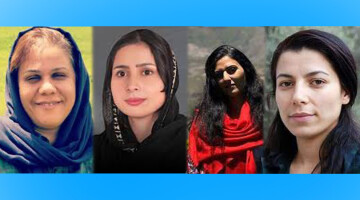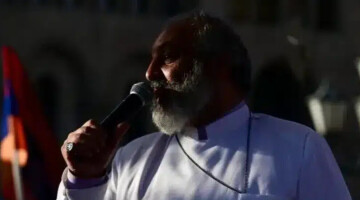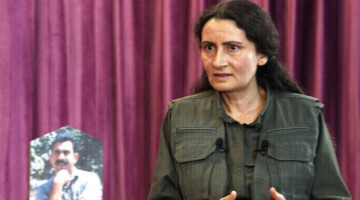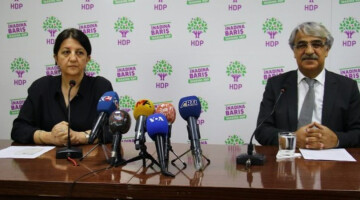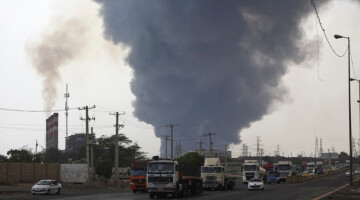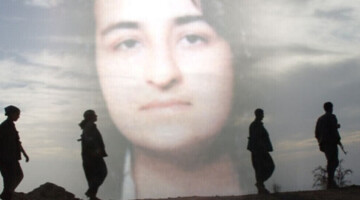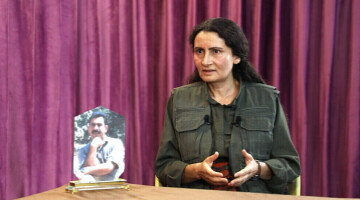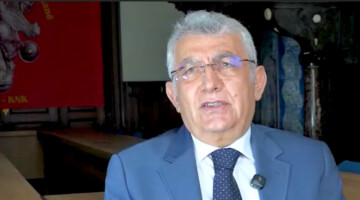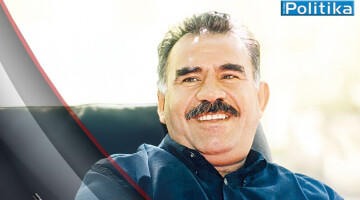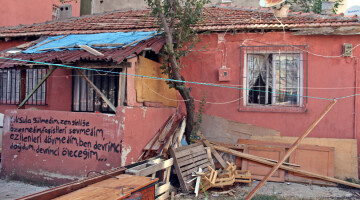With the start of the Rojava Revolution on July 19, 2012 and cities taken from the regime, attacks on the Rojava border were carried out by gangs and openly.
Since 2012, AKP has attempted to smother the Rojava Revolution through Kobanê to Efrîn by collaborating with several gang groups like ENKS, Ahrar Al Sham, Al Nusra Front and ISIS on a coordinator level.
Despite repeated failures of the well-documented alliance of AKP and gangs, the AKP-led Turkish state continues its attacks on every front. Although gang attacks on Serêkaniyê, Kobanê and Girê Spî (Tel Abyad) over the border line were pushed back by YPG, and their partner ISIS was pushed back from the borders of Rojava up to 800 km, AKP continue border violations and attacks on Rojava and Northern Syria.
The Turkish state can’t accept that all of the 911 km Rojava-Turkey border is under control of Rojava Democratic Autonomous Administration, except for Jarablus and Rai, and launches an open invasion maneuver on the Shehba region, while they open fire on YPG forces and civilians through the border and attempt to cross small groups of gangs.
YPG Frontier Quarters Commander Reşît Ömer said the attacks by the invading Turkish state that have continued for years increased with the launch of the Operation Wrath of Euphrates and the attempts to smuggle gang members have become more frequent. Ömer said: “We are strengthening border security against these attacks. Our forces have the right and authority to retaliate against these attacks in the basis of legitimate self defense.”
“THE GREATEST THREAT TO US COMES FROM THE TURKISH BORDER”
Reşît Ömer stressed that the Turkey-Rojava border is quite long, and said: “After the revolution, we saw that the greatest threat to us came from the Turkish border. We have quite long borders with Turkey and other states. Between Efrîn and Semêlka is the Northern Kurdistan border. From Semêlka to Shaddadi is the Southern Kurdistan and Iraq border. We take necessary precautions to stop gangs passing through the south border and ensure the safety of our society, but our greatest problem is on the Northern Kurdistan border. After the revolution, we as the YPG decided to reevaluate the border deployment decision. We said, ‘We will protect our border by employing deployment as needed’. We kept the border quarters we took over from the state. But during the revolution process, we saw that the gangs who attack our people mostly come from the border with Turkey. Again, their weapons, food, medicine are organized by Turkey and are sent over. Turkey attempted to invade several of our territories with gang groups sent over the border and they carried out massacres. Although all their attempts were voided, they continue on their dirty plans.”
THE SERÊKANIYÊ ATTACK WAS THE FIRST
The relationship between AKP and the gangs was first revealed in a concrete way through the attacks on Serêkaniyê on November 8, 2012. On that day, hundreds of gang members allied to FSA came from Turkey and crossed over to Serêkaniyê through Serxet (Ceylanpınar) border gate and attempted to invade the city. The regime fired artilleries after the gangs crossed over. In the YPG’s intervention, a large number of gang members were killed. At least 10 civilians lost their lives in the city in one week, some 70 were wounded, around 50 houses were demolished and over 11 thousand people moved away. Several documents obtained after intense clashes proved AKP’s relationship with these gangs.
ATTACK ON KOBANÊ FROM SAME LOCATION
Several documents had surfaced showing Turkey’s involvement in the great attack on Kobanê that ISIS launched on September 13, 2014 and that ended with the victory of YPG/YPJ forces on January 25, 2015. Documents had also surfaced showing the Turkish border being used for passage and reinforcements, ISIS members posing for pictures with the Turkish army had been in the press.
The Turkish state couldn’t handle the Kobanê attack turning into the Kobanê victory that got roused the whole world, and took part in the Kobanê massacre committed by ISIS on June 25, 2015. In the massacre ISIS committed by infiltrating Kobanê from three separate zones, including Turkey, and sneaking in carbombs and gang members on June 25, 251 civilians were killed (among them 35 children and 64 women) and 267 civilians were wounded.
EFFORTS CONTINUE IN GIRÊ SPÎ
ISIS attacked Girê Spî, Siluk and Mebruka on three fronts, through gang members placed in these areas, to separate Kobanê and Cizirê Cantons on February 27. In these attacks, 23 civilians and 43 members of YPG/YPJ and self defense forces who retaliated lost their lives. With the intervention of YPG forces, 291 ISIS members were killed and 6 were taken prisoner.
Leading up to the Girê Spî attack, YPG positions on the border between Turkey and Girê Spî were shelled by Turkish DSHK guns for four days. During the gang attacks on Girê Spî on February 27, Turkish soldiers opened fire on YPG positions along the borderline. In Nestel, 1 YPG fighter lost his life when Turkish soldiers opened fire and asayish members were wounded.
After the attack was defused, it came to light that the massacre in Girê Spî was organized by MİT and ISIS. The complete liberation of Girê Spî on the border line on June 15, 2015, the 46th day of the Rûbar Qamishlo Operation, was a great blow to the alliance and exchange between the Turkish state and ISIS. The Turkish state played an organizing and planning role in this attack to reopen this border gate with ISIS and to separate Cizirê and Kobanê Cantons in Rojava. This role has been proven with many documents. The gang members caught alive during the attack process also said in their confessions that Turkey made invasion plans with ISIS, they were promised reinforcements from Turkey after the attack started but the Turkish state didn’t keep this promise.
“THE TURKISH ARMY ATTACKS ROJAVA FROM THE BORDERLINE CONSTANTLY”
The Turkish state both attempts to cross gang members over to Rojava, and opens fire with heavy weapons on YPG positions and the civilian population on the border, violating international rules of engagement. Reşît Ömer says Turkish state repeatedly states that being neighbors to Rojava poses a threat for them, but it is the Turkish army that constantly attacks Rojava despite there being no attacks towards Turkey by the YPG.
Ömer said the Turkish state displayed animosity towards Rojava and Kurds and violates international conventions and continued: “They target both our forces positioned on the border line and the civilian population with heavy weapons. The fields of the people of Rojava have always been on this borderline for all of history. In some places the fields continue all the way to the border fence. The Turkish state opens fire on the people working in their fields. In some places, they don’t let the people in 1 km range to plow their land and work in their fields. They don’t allow people to go and feed their animals. They start shooting. And they work with thermal bullets so they hit their targets hard - they assassinate the people, knowing they are civilians. They even kill the animals. The fields received a lot of damage in the Turkish state’s attacks. The soldiers also cross over to our territory and outright violate the border.”
THEY KILL, BUILD A WALL, DIG DITCHES, CUT DOWN TREES
YPG Press announced in regular statements and the yearly balance that the Turkish army had hit YPG positions over the border 22 times in the year 2015. As was also in the media, the Turkish state also opened fire on Sorika village residents on the border line in Efrîn’s Reco district on May 4, 2015. Houses in the village were severely damaged and the villagers lost access to their fields.
The Turkish army’s border attacks increased in 2016. The Turkish state targeted YPG positions and civilians on the Rojava border dozens of times in 2016.
* They hit YPG positions and the civilian population with heavy weapons a total of 152 times: 1 in January, 9 in February, 6 in March, 14 in April, 13 in May, 17 in June, 22 in July, 17 in August, 26 in September and 17 in October.
* As a result of these attacks, 2 civilians lost their lives in February, 4 in April, 2 in Kobanê in May, 1 child in Girê Spî in June, 4 civilians and 2 YPG members in August, 9 civilians in September and 2 civilians in October - a total of 24 civilians and 2 YPG members.
* A total of 127 civilians and 2 YPG members were wounded: 1 civilian in February, 4 in April, 2 civilians in Kobanê in May, 9 civilians in Girê Spî in June, 50 civilians and 2 YPG members in August, 61 civilians in September and 2 Civilians in October.
* These attacks where the Turkish state used DHSK weapons, mortars and barrel bombs dropped from planes in Efrîn resulted in deaths, injuries, damage to homes and fields, and deaths of animals.
AIRSPACE VIOLATED AS WELL
The AKP-led Turkish state didn’t only open fire on the YPG forces and the civilian population and smuggle gang members across the border. AKP repeatedly violated Rojava territory under Rojava Democratic Autonomous Administration control with soldiers, drones and helicopters.
* Throughout the Rojava Revolution, AKP dug ditches and built walls in Rojava territory from Endîwer village in Derîk on the border to Efrîn. They cut down thousands of olive trees in Efrîn and invaded some areas in Rojava.
* Journalists in the news watch protest titled “No Silence” held by Rojava journalists against the massacres in Nusaybin documented Turkish soldiers violating the border numerous times and shared their footage with the public.
* In August, Turkish soldiers crossed the border with armored vehicles twice and violated Rojava territory.
* Turkish army helicopters crossed the border twice.
* Jet fighters bombed Efrîn Canton once.
* In September Turkish soldiers crossed over to Rojava territory twice with armored vehicles, and drones flew over Rojava territory 3 times.
ATTACKS INCREASED AFTER THE RAQQA OPERATION
Reşît Ömer said the Turkish state attacks increased after the Operation Wrath of Euphrates was launched and continued: “I’m on the borders daily myself, and we take reports from all our forces on the borders daily. Before the Raqqa operation, they opened fire when they pleased, but after the operation the attacks increased.”
The results of AKP’s attacks on the Rojava Democratic Autonomous Administration territory in the 17 day period following the launch of the operation to liberate Raqqa that AKP attempted to prevent YPG from taking part in are:
*On November 5, at 21.00, a drone flew over Tilşeriye village to the west of Kobanê and YPG positions were fired at from the Turkish border simultaneously.
*The Turkish state opened fire on YPG positions in Ziravekê village to the west of Kobanê twice on November 6 in the morning and evening.
* On November 7, the Turkish army attempted to smuggle in gang members from two positions on the border. First, a 12 people gang group entered Rojava territory protected by Turkish army’s armored vehicles in Doda between Amude and Qamishlo. As gang members entered Rojava, the Turkish army shelled YPG positions from the armored vehicles. When YPG forces intervened, 2 gang members were injured in the clash and the group retreated to the Turkish side. The second spot gang members tried to cross over to Rojava territory that night was to the west of Kobanê. The gang group tried to enter Rojava at 19.00 and were caught in YPG’s controls. In the resulting clash, the gang retreated to Turkey.
* The Turkish army attacked Gelbenav, Koran and Elsen villages in Girê Spî on November 7.
* On November 8, the Turkish army opened fire from two separate locations on YPG positions in Dola Kel Hesenekê and Çil Axa in Tirbespiyê and YPG headquarters in Melê Ebbas between them and Tirbespiyê. YPG forces retaliated against this attack.
* On November 10, 12 and 13, at 18.15, artillery shots were fired from the Turkish army border outpost in Cisir Heşarkê region in Raco district. In the artillery fire on November 10, one child and one HPC-Jin member lost their lives.
* On November 17, 2 helicopters of the invading Turkish army flew over Merwaniyê village in Efrin Canton’s Şiyê district.
* The invading Turkish army started digging trenches last week in the line of Eyn Diwarê, Kerdîmih, Hav Metre and Habil Hewa border villages and damaged large swathes of cultivated land. As a result of the Turkish soldiers digging trenches on November 17 near Tigris River in Eyn Diwarê village, thousands of acres of land is facing the threat of flooding.
“WE WILL DEFEND OURSELVES”
YPG Frontier Quarters Commander Reşît Ömer pointed out that in addition to opening fire and bombing from the border line, the Turkish state is still trying to cross gangs into Rojava in small groups, and said that YPG forces intervened with these. Ömer stated that the attempts by the Turkish state focused in the Qamishlo-Endiwer line in Cizîr Canton and the line between Sêrekaniyê in Cizîr and Girê Spî in Kobanê and continued: The Turkish state’s border line attacks are intensifying both in the sense of crossing gang groups over and opening fire on our positions and civilians. We as the YPG are strengthening our border security. We are strengthening all our frontier quarters and positions in all borders. Our friends have the right to answer all attempts and attacks by the Turkish state. This is our most fundamental right to legitimate self defense.”


